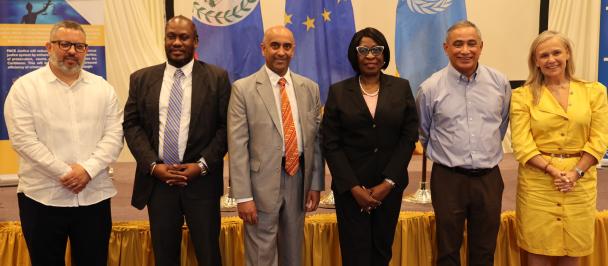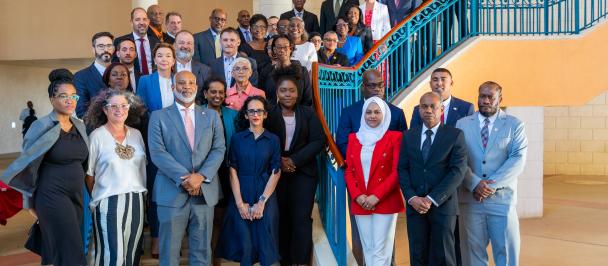PACE Justice
The Partnership of the Caribbean and the European Union on Justice

Background
Efficient access to justice is being undermined across the Caribbean by delays within several key stages of the criminal justice process, resulting in major backlogs of cases. The identified backlogs are due to pervasive human and technological resource and capacity constraints, which, in turn, have contributed to massive bottlenecks in the work of the investigators, public prosecutors and courts. As a result, these backlogs directly contribute to the worryingly high levels of prisoners on remand for extended periods and serve to increase overall incarceration rates in the region – which are already among the highest globally. The impact of these backlogs are disproportionately borne by young males, with the vast majority of those on remand being males between the ages of 18 and 35 years.
The reasons for these backlogs are numerous, ranging from weaknesses in police data capture, outdated course case handling systems and processes, paper-based evidence management systems, limited digitalization of corrections system processes and witness tampering and intimidation, which disproportionately affects women and victims of gender-based violence and intimate partner violence.
Justice system reform requires coordination and collaboration among the various agencies and institutions in order to mitigate the effect of the potentially conflicting approaches to the causes of the backlog. The project will work closely with the various key stakeholders in the criminal justice system, including the public prosecution offices, police, legal aid, prisons and courts in each country.
The UNDP outputs will be aligned in the framework of the overall EU Europe Latin America Programme of Assistance against Transnational Organised Crime (EL PAcCTO) which seeks to address the entire criminal chain from an integral perspective through its work in three components: police, justice and penitentiary and will work in coordination with other related activities being undertaken by the EU Delegation in Barbados.
Participating Countries:
Antigua and Barbuda, Barbados, Belize, Dominica, Guyana, St. Kitts and Nevis, St. Lucia, Trinidad and Tobago.

|

|

|

|

|

|

|

|
Expected Results:
1. Enhanced technology and infrastructure systems: Deployment of enabling technology and systems training to improve efficiency of criminal justice administration.
2. Empowered stakeholders and enhanced capacities: Gender-aware capacity-building across all elements of the administration of justice, with a focus on service design and delivery.
3. Improved efficiency in the justice sector: Strengthening national and regional processes and procedures for improved efficiency, coordination and accountability within the justice sector.
The PACE Justice regional programme will contribute to progress on Sustainable Development Goals 16 (peace, justice and strong institutions), 5 (gender equality) and 10 (reduced inequalities).

|

|

|

 Locations
Locations












